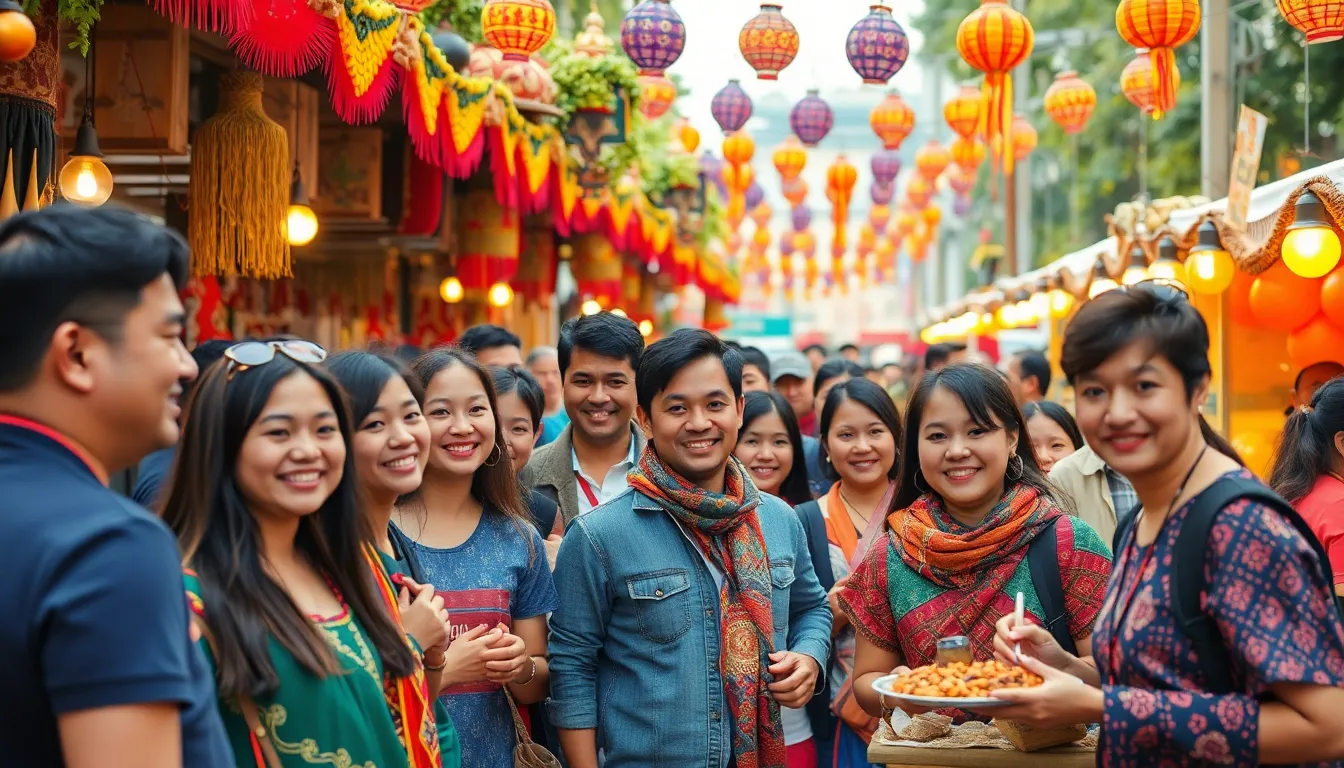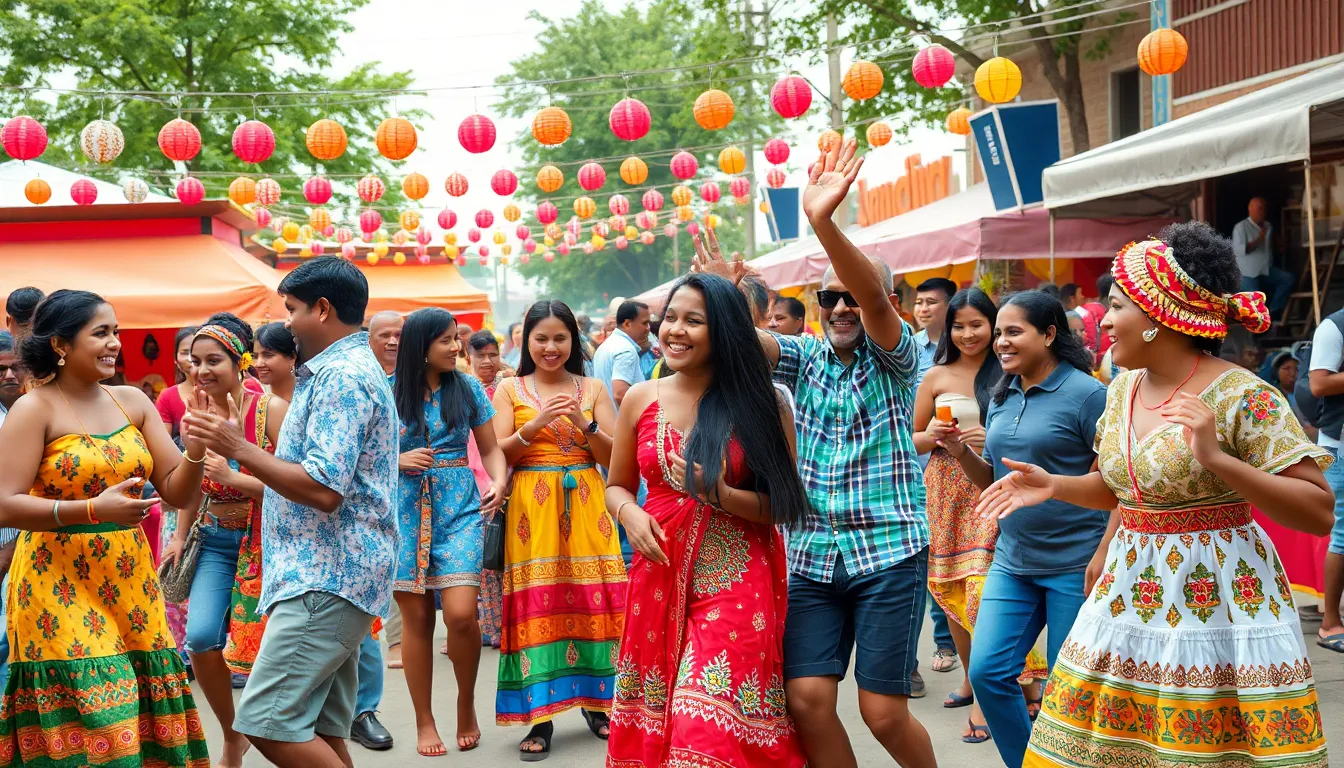Tradition is like that favorite old sweater: it’s cozy, familiar, and sometimes a little moth-eaten. It wraps people in a sense of belonging, connecting generations through shared customs and stories. From quirky family rituals to grand cultural celebrations, tradition adds flavor to life, making it richer and more meaningful.
But let’s face it—some traditions can be downright baffling. Who decided that throwing cake at a bride is a good idea? Yet, despite the oddities, these customs create a tapestry of experiences that define who we are. In a world that’s constantly changing, embracing tradition can be the perfect antidote to the chaos. Join the journey as we explore the delightful, sometimes hilarious, and always fascinating world of tradition.
Table of Contents
ToggleUnderstanding Tradition
Tradition holds a special place in societies, creating bonds and preserving cultural heritage. It connects individuals across generations through shared experiences.
Definition of Tradition
Tradition encompasses customs, beliefs, and practices passed down within groups. These customs often reflect the values and history of a community. It serves as a framework for understanding identity and social norms. Traditions can manifest in various forms, from holidays to rituals. Understanding these elements helps highlight their importance in daily life and community cohesion.
Types of Traditions
Types of traditions include cultural, familial, and religious customs. Cultural traditions express a group’s unique identity, such as festivals and dances. Familial traditions focus on practices within families, like reunions and special meals shared. Religious traditions involve ceremonies and observances tied to faith, such as prayer and worship. Recognizing these categories enriches understanding of how traditions influence lives.
The Role of Tradition in Society

Tradition plays a crucial part in shaping societal structures, influencing identity, and fostering connections.
Cultural Identity
Cultural identity stems from traditions woven into the fabric of communities. Traditions celebrate unique practices that highlight cultural narratives, such as festivals or rituals. They create a sense of belonging among individuals, allowing them to connect to their heritage. Through music, dance, and culinary customs, groups express their cultural journey and values. By recognizing these traditions, individuals form a cohesive identity that honors their past while navigating modern influences. Diversity thrives within cultures, enriching society with varied perspectives and experiences.
Community Cohesion
Community cohesion thrives on shared traditions that unite people. Regular gatherings and celebrations reinforce bonds among community members. These events create opportunities for interaction, fostering mutual understanding. Participation in local traditions sparks pride and instills a sense of responsibility within the community. As individuals engage with one another through these practices, they cultivate lasting relationships. Tradition encourages support networks, strengthening resilience in times of change. Overall, the observance of communal customs cultivates a supportive environment where shared values flourish.
Tradition vs. Modernity
Tradition and modernity often present contrasting values, creating tensions in various aspects of life. Society continues to face dilemmas as the younger generation challenges established norms, seeking innovation and change. Cultural practices that once unified communities now prompt debates over relevance and practicality. This conflict becomes evident when traditional customs clash with contemporary ideals and lifestyles. Traditions rooted in history sometimes struggle to adapt and remain meaningful in today’s fast-paced world. Maintaining a balance between honoring the past and accommodating the future requires active dialogue and understanding.
The Conflict of Values
Conflicting values manifest when traditional beliefs encounter modern perspectives. Generational differences often amplify these tensions, as younger people favor progressive ideas, while older generations prioritize established customs. Issues such as gender roles and marriage practices illustrate the struggles related to evolving norms. Some individuals feel torn between adhering to cultural expectations and embracing contemporary changes. With the rise of globalization, maintaining unique cultural identities becomes increasingly complex. Societies benefit from open discussions to bridge these gaps, fostering respect and promoting awareness.
Adapting Traditions in Contemporary Times
Adapting traditions in contemporary times ensures cultural relevance and vitality. Innovative practices emerge when communities integrate aspects of modern life into their customs. Festivals showcase dynamic interpretations of age-old practices, attracting diverse audiences and encouraging participation. Engaging younger generations often involves incorporating digital platforms to share stories and promote cultural heritage. Some groups reinvent culinary traditions by introducing fusion cuisine, blending old and new flavors. These adaptations maintain the essence of tradition while reflecting current societal norms. Embracing change aids communities in preserving their identities and enriching their collective experiences.
The Significance of Tradition in Various Cultures
Tradition plays a vital role in shaping cultural identities across the globe. Its nuances vary, but the underlying importance remains consistent.
Eastern Traditions
Eastern traditions often emphasize community and familial bonds. Festivals such as Diwali and the Lunar New Year highlight shared values and collective participation. Rituals like tea ceremonies in Japan showcase respect and harmony, reflecting deeper philosophical beliefs. Traditions also encompass ancient practices in many Eastern societies, linking current generations with their ancestors. Practices pass down knowledge and life lessons, enriching individual experiences within a communal framework. Through these customs, individuals cultivate a strong sense of identity while ensuring cultural continuity.
Western Traditions
Western traditions frequently revolve around individualism and personal expression. Celebrations like Thanksgiving and Christmas focus on gathering with family and expressing gratitude. Cultural events such as Independence Day embody national pride and history, while other customs celebrate personal milestones, including weddings and graduations. Each tradition serves to reinforce social connections and shared values within communities. Diverse regional customs across Western societies add richness to the cultural landscape, allowing people to appreciate both heritage and contemporary practices. These traditions adapt over time, blending modern influences while staying true to core principles.
The Future of Tradition
Tradition continues to evolve while maintaining its core significance. The interplay of innovation and cultural heritage shapes its future.
Innovations and Changes
Traditions undergo transformation through technological advancements and societal shifts. Communities incorporate elements like social media to rejuvenate age-old customs, enhancing accessibility and engagement. Festivals now feature virtual components, allowing wider participation. Young people influence modern interpretations, setting new trends while respecting traditional values. Innovations provide platforms for diverse voices, enriching cultural exchange. As traditions adapt, they resonate with contemporary values and daily life. This continuous evolution ensures traditions remain relevant without losing their essence.
Preserving Heritage
Heritage preservation remains vital in maintaining cultural identity. Through targeted efforts, communities celebrate their unique customs and memories while emphasizing historical significance. Documentation of traditions in various forms, such as video recordings or written narratives, captures their richness. Local initiatives focus on educational programs to raise awareness and appreciation among younger generations. Engaging storytelling passes down customs, fostering a sense of belonging and continuity. Collaboration among cultural organizations further strengthens efforts to protect these vital elements. Through these actions, traditions thrive, interweaving past and present to create a resilient cultural fabric.
Tradition plays a vital role in shaping identities and fostering connections within communities. It serves as a bridge between generations while providing comfort and a sense of belonging. As society evolves, the adaptation of traditions ensures they remain relevant and meaningful in modern contexts. Embracing both heritage and innovation allows communities to celebrate their unique narratives while inviting dialogue between differing perspectives. By nurturing traditions, individuals can cultivate a resilient cultural fabric that honors the past while embracing the future. This balance enriches lives and strengthens the bonds that unite people across diverse backgrounds.




